Sometimes a single letter can make a difference.
There was once a punishment called a Ducking Stool and there was another
punishment call a Cucking Stool. You may be familiar with the Ducking Stool, as
you may have seen old engravings of them, with a crowd of picturesquely dressed
people ducking an unfortunate woman sitting in one into the village duck pond.
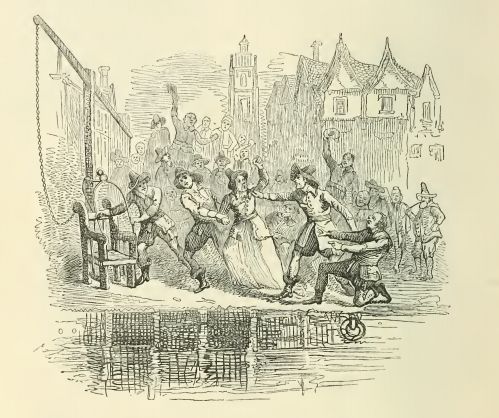 |
| To the Ducking Stool |
It’s a moot point if the name comes from the act of the ducking or if it comes
from name of the ponds where the ducks did their dabbling. The Cucking Stool
was slightly different. There is a folk etymology that the name derives from ‘cuckold’
and it was a punishment for unfaithful wives who cuckolded their husbands but
this is false.
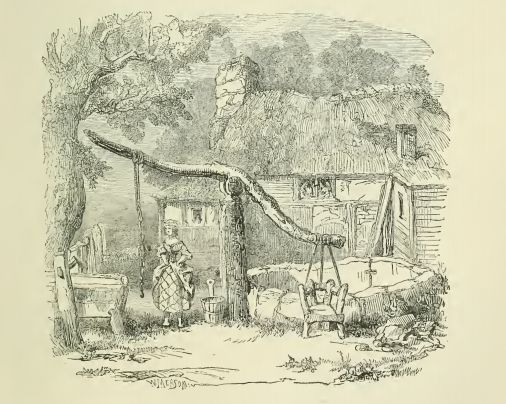 |
| Rustic Ducking Stool |
The name comes from cukken, an old word meaning ‘to
defecate’, and derives through the Dutch word kakken, the Latin cacāre
(both having the same meaning) and back to the Greek κακός ‘kakos’ which means ‘bad, worthless,
vile’, (and incidentally, it is found in the euphemistic word poppycock,
which is really pappe kak – ‘soft faeces’).
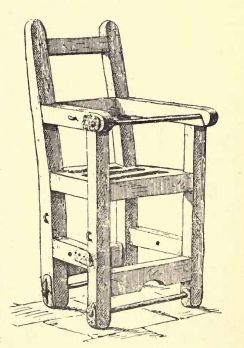 |
| Cucking Stool from Scarborough |
A cucking stool
was, originally, a stool with a hole cut into the seat and was used as a
commode. From at least the time of Edward the Confessor, and maybe well back
into the time of the Saxons, the punishment for brewing bad ale at Chester was
to be placed in the cathedra stercoris (‘the dung chair’) and to
be placed either outside your own door or in a public place (this chair is
recorded in the Domesday Book entry for Chester,
“Similiter malam cervisiam faciens, aut in Cathedra ponebatur stercoris, aut iiii. solid, dab prepositis.).
It was a deliberately degrading punishment, caught ‘at stool’
on the stool, so to speak.
 |
| A Vision of Piers Plowman |
In A Vision of Piers Plowman (c. 1360-87), a wyuen
pyne (woman’s pain i.e. punishment) is mentioned, in a couplet usually
translated as
“Thomas Stowe he taught to take two staves,And fetch Felice home from the ducking stool.”
A local authority directive from Leicester
dated 1457, orders,
“…scolds to be punished by the mayor on a cuck-stool before their own doors, and then carried to the four gates of the town.”
Bad ale wives and ‘itinerant singing women’ were sentenced to be placed
on the cucking stool throughout Scotland, and a statute of Henry VIII ordered
carders and spinners of wool who were convicted of fraudulent practices
“…to be sett upon the pillory or the cukkyng-stole, man or woman, as the case shall require.”
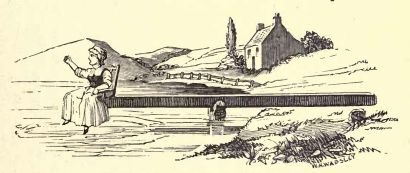 |
| Ducking Stool |
It became the normal practice, over the years, for men to be
placed in the pillory or the stocks and for women to be placed on the cucking
stool, (also called, on occasion, a ‘thewe’). James Boswell, in his Life
of Dr Johnson, records Johnson in conversation with Mrs Knowles,
“Madam, we have different modes of restraining evil: stocks for the men, a ducking-stool for women, and a pound for beasts.”
It seems, from the early
descriptions, that those on the cucking stool were not ducked, but as time
passed the two names became synonymous.
 |
| M Misson - Travels over England - 1719 |
From 1719 we have an account from a
Frenchman, M. Misson, in his Travels over England,
“The way of punishing scolding women is pleasant enough … They place the woman in this chair, and so plunge her into the water, as often as the sentence directs, in order to cool her immoderate heat.”
However, the punishment was not always ‘pleasant’,
as an undated chapbook called Strange and Wonderful Relation of the Old
Woman who was Drowned at Ratcliff Highway a fortnight ago tells how the
unfortunate old woman was ducked too often for too long and was killed.
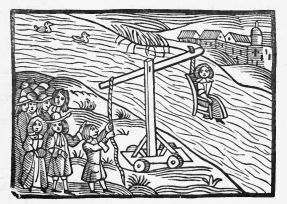 |
| Old Woman Drowned at Ratcliff Highway |
It can
be seen in the woodcut taken from this chapbook, the ducking stool was fitted
with wheels, indicating that it could be brought out of storage when required,
but in some places it was a permanent fixture. William Cole, the antiquary
(born 1714), wrote that when he was boy, he saw a woman ducked for scolding
from a bridge in Cambridge. A beam of timber was fixed to the middle of the
bridge and a chair was hung from one end; the woman was tied into the chair and
it was let down into the river three times.
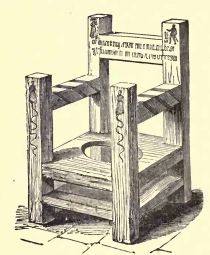 |
| The Cucking Stool at Sandwich |
The chair at Sandwich was decorated
with images of devils punishing scolds and was engraved with the words,
“Of members ye tonge is worst or best,An yll tonge oft doeth breede unrest.”
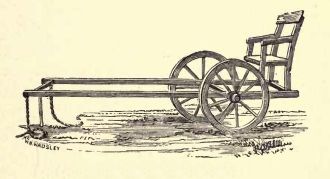 |
| Tumbrel style ducking stool |
A
variation was the tumbrel, a wheeled chair that was driven through the streets
before being pushed into the water and the seat tipped backwards, thus ducking
the victim (the tumbrel, or tip cart, later gained notoriety when it was used
to transport victims of the French Revolution to the guillotine). The ducking
stool was mostly used on the Xanthippic, punishing scolds and shrews for their
nagging, gossiping and rumour-mongering, although the mothers of illegitimate
children, drunken women, strumpets and prostitutes were also sentenced to be
dunked.
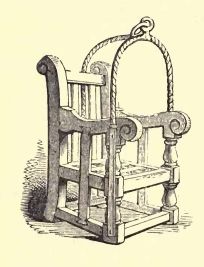 |
| Ducking Stool from Ipswich |
At Beverley, Yorkshire, there are records of scolds being ducked,
together with brewers of bad ale and bakers of bad bread. In July 1694, at
Leeds, it was ordered that Anne Saul,
“…a person of lewd behaviour, be ducked for daily making strife and discord amongst her neighbours.”
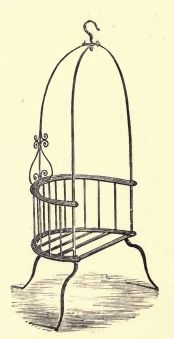 |
| Ducking Stool - Plymouth |
There
is a ducking stool preserved at Leominster, Herefordshire, and it was here that
the last recorded ducking took place in England, in 1809, when a notorious nag
called Jane Corran, also known as Jenny Pipes, was paraded through town in the
chair and then ducked by the Kenwater Bridge, by order of the magistrates. An
eyewitness recorded that her first act, after being released, was to launch a
tirade of oaths and curses at the magistrates.
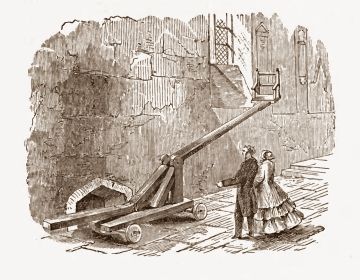 |
| Ducking Stool at Leominster |
In 1817, Sarah Leeke was also
paraded through town but she was not ducked, as the level of the water was too
low. In 1824, a woman was sentenced to be ducked three times in Pennsylvania,
USA, but the Supreme Court of Pennsylvania rescinded the sentence after they
decided that the punishment was obsolete and ‘against the spirit of the age.’
No comments:
Post a Comment